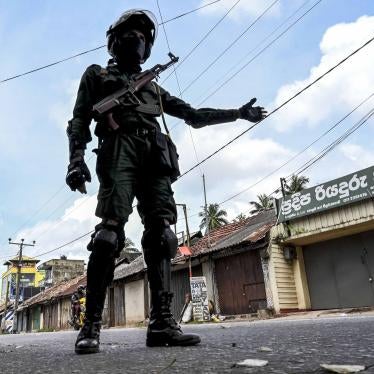(New York) -- Human Rights Watch today reiterated its call to the U.S. government to respect the fundamental rights of individuals detained in connection with investigations into the September 11 attacks. Most of those detained are from the Middle East and South Asia, including 208 from Pakistan.
On November 27, U.S. Attorney General John Ashcroft announced that, as a result of the government's investigation of the September 11 attacks, 603 people remain in custody. A total of 93 named persons were charged with federal criminal offenses, of whom 55 are in custody. Most of the criminal charges are reportedly minor and not directly linked to terrorism. A total of 548 persons are being detained on alleged immigration violations uncovered during the investigations; only their nationalities were provided, not their names.
The Attorney General's announcement fell short of the Freedom of Information Act request by Human Rights Watch and other groups, asking the U.S. government to release the names, places of detention and basis for detention of the detainees held in connection with the September 11 investigations. The government has to date refused Human Rights Watch access to detention centers to monitor the conditions of confinement of persons detained in connection with the September 11 investigations.
On October 29, Human Rights Watch wrote to the Federal Bureau of Investigation to express its serious concern over the death of Muhammed Butt, a Pakistani citizen, who was detained by the Immigration and Naturalization Service and held at the Hudson County Correctional Center. In the letter, the rights group urged the FBI and the Hudson County Prosecutor's Office to thoroughly investigate the circumstances of his death. Human Rights Watch has been unable to determine whether an inquiry was undertaken.
Human Rights Watch also criticized new U.S. anti-terrorism measures that authorize military trials of those accused of terrorism, permit prolonged administrative detention without charges, enable the government to monitor communications between federal detainees and their attorneys.
"Washington seems ready to sacrifice basic human rights in its campaign against terrorism in the U.S.," said Sidney Jones, Asia Director of Human Rights Watch. "Even in the current crisis, the U.S. government has an obligation to protect the rights to freedom from arbitrary detention and to a fair trial, rights possessed by citizens and non-citizens alike."
On November 13, President Bush issued a Military Order authorizing the trial of non-citizens by special military commissions when he has reason to believe such persons may be members of al Qaeda or have engaged in or aided acts of international terrorism. The order fails to ensure such trials would comport with basic obligations of justice, fundamental fairness and due process guaranteed under U.S. law and by international human rights treaties.
"Under this Military Order, a defendant could be sentenced to death without a public trial, the presumption of innocence, a right to appeal, or even proof of guilt beyond reasonable doubt," said Jones.
The U.S.A. Patriot Act of 2001, signed by President Bush on October 26, gives broad, unprecedented powers to the U.S. Attorney General to certify and then detain non-citizens suspected of terrorist activities or of threatening national security. The law contains vague definitions of "terrorism" and other key terms, and fails to provide meaningful judicial review for detainees wishing to challenge their certifications and subsequent detention. The new law also includes provisions that may lead to the indefinite detention of non-citizens.
New rules promulgated by the Immigration and Naturalization Service (INS) extend the period of time non-citizens can be held for questioning, with the possibility of prolonged or indefinite detention in "emergency" circumstances. Another new rule permits the INS to keep non-citizens detained even after immigration judges have ordered their release for lack of evidence. A new rule issued by the federal Bureau of Prisons permits the government to monitor communications between certain federal detainees and their attorneys when the government believes those communications may further acts of terrorism.
Since the September 11 attacks, governmental and nongovernmental monitoring groups have received several hundred complaints of bias attacks and hate crimes against people of Middle Eastern, Arab, and South Asian descent, including Pakistanis. The attacks range from murder and violent assaults to the vandalizing and burning of mosques, Sikh and Hindu temples, stores, and homes.
Human Rights Watch has urged the U.S and state governments to adopt measures to address such hate crimes. It has called on U.S. law enforcement officials to provide enhanced protection for targeted individuals and groups and their homes, places of business, and houses of worship; to ensure that any reports of criminal behavior are properly investigated; and to hold accountable those found responsible.
Information on U.S domestic anti-terrorism measures and Human Rights Watch's concerns is available here.






